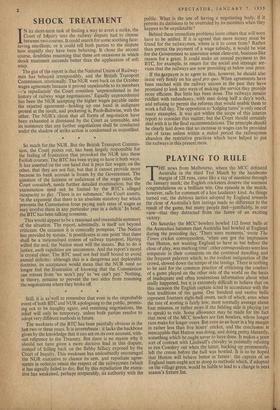PLAYING TO RULE
THE news from Melbourne, where the MCC defeated Australia in the third Test Match by the handsome margin of 128 runs, came like a ray of sunshine through the January murk; the English cricketers deserve the warmest congratulations on a brilliant win. One episode in the match, however, calls for comment of a less laudatory kind. As things turned out, the dubious tactics adopted by England towards the close of Australia's first innings made no difference to the result of the game, but many people feel—justifiably, in our view—that they detracted from the lustre of an exciting victory. On Saturday the MCC bowlers bowled 112 fewer balls at the Australian batsmen than Australia had bowled at England during the preceding day. 'There were moments,' wrote The Times cricket correspondent, 'when one got the impression that Hutton, not wanting England to have to bat before the close of play, was marking time'; other correspondents were less temperate in their comments on the continual dawdling and the frequent palavers which, to the evident indignation of the crowd, slowed down the tempo of the innings. There is nothing to be said for the common practice of criticising the conduct of a game played on the other side of the world on the basis of inadequate and often tendentious information about what really happened, but it is extremely difficult to believe that on this occasion the English captain acted in accordance with the best traditions of the game. One hundred and twelve balls represent fourteen eight-ball overs, each of which, even when the rate of scoring is fairly low, must normally average about four minutes, or rather more if the fielding side is playing (so to speak) to rule. Some allowance may be made for the fact that most of the MCC bowlers are fast bowlers, whose longer runs make for longer overs. But even so an hour is a big margin in rather less than five hours' cricket, and the conclusion is inescapable that Hutton was doing, and doing pretty blatantly, something which he ought never to have done. It makes a poor sort of contrast with Lindwall's chivalry in pointedly refusing to run Cowdrey out when the latter, backing up prematurely, left the crease before the ball was bowled. It is to be hoped that Hutton will behave better in future: the captain of an England team ought not to stoop to methods which, if adopted on the village green, would be liable to lead to a change in next season's fixture list.














































 Previous page
Previous page